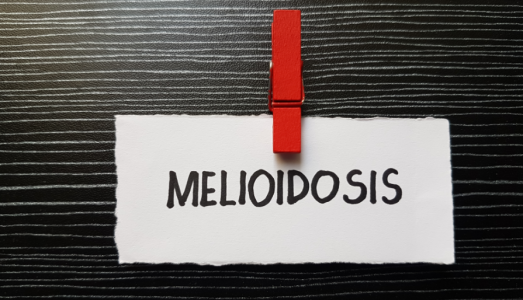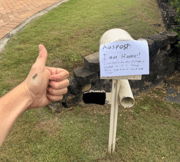Researchers discuss urgent response to new bacterial infection threat
By
Gian T
- Replies 106
As the northern regions of Australia brace for the wet season, a beacon of hope shines on the horizon for those concerned about the tropical disease known as melioidosis.
This potentially fatal infection, caused by the bacterium Burkholderia pseudomallei, which is found in soil and water, has long threatened residents of these lush areas.
But now, thanks to the tireless efforts of researchers worldwide, a vaccine may soon be within reach.
Experts gathered in Darwin for the 10th World Melioidosis Congress to discuss the latest advancements in combating this silent killer.
Melioidosis can lead to severe health issues, including chest infections, breathing difficulties, headaches, non-healing skin sores, confusion, and joint swelling.
In the Northern Territory alone, the past year saw 80 people contract the disease, with five tragic fatalities.
However, the collaborative spirit of the scientific community is bringing us closer to a solution.
Professor David Wagner of Northern Arizona University in the United States expressed optimism about progress.
'We are hopeful through a joint US-Australia collaboration that we'll be putting shots in arms up here in the Darwin area … in the next year or two,' he stated.
The Menzies School of Health Research in Darwin, a leader in melioidosis research, has been instrumental in these developments.
Senior researcher Mark Mayo highlighted that advancements in treatment have already improved survival rates for those infected.
The discovery of melioidosis in Mississippi, USA, has raised alarms about the disease's potential global spread.
This revelation has spurred efforts to search for the bacterium in other parts of the United States and beyond.
Back in Darwin, preparations for the wet season are underway with increased vigilance.
Professor Bart Currie from the Menzies School of Health Research emphasised the importance of early preventative measures, including adjustments to emergency department protocols and laboratory practices.
For those living in rural areas, particularly individuals with diabetes or compromised immune systems, Professor Currie advised caution with bore water, suggesting bottled water or installing chlorinators or UV filters.
Construction workers are also being educated on the risks following incidents in Cairns where labourers fell ill.
The disturbance of soil during construction can propagate the bacteria, which can then be aerosolized by heavy rain and winds.
To protect yourself, minimising contact with contaminated soil and water is crucial.
Wearing gloves and closed-toed shoes while gardening, avoiding muddy waters during the wet season, or washing off any exposure immediately can significantly reduce the risk of infection.
As we await the vaccine rollout, these precautions are our best defence against melioidosis.
The dedication of researchers and health professionals gives us hope that soon, this disease will pose less of a threat to the health and well-being of Australians and people worldwide.
 How do you feel about melioidosis spreading to different places? What should be done to raise awareness in those areas? Let us know in the comments below.
How do you feel about melioidosis spreading to different places? What should be done to raise awareness in those areas? Let us know in the comments below.
This potentially fatal infection, caused by the bacterium Burkholderia pseudomallei, which is found in soil and water, has long threatened residents of these lush areas.
But now, thanks to the tireless efforts of researchers worldwide, a vaccine may soon be within reach.
Experts gathered in Darwin for the 10th World Melioidosis Congress to discuss the latest advancements in combating this silent killer.
Melioidosis can lead to severe health issues, including chest infections, breathing difficulties, headaches, non-healing skin sores, confusion, and joint swelling.
In the Northern Territory alone, the past year saw 80 people contract the disease, with five tragic fatalities.
However, the collaborative spirit of the scientific community is bringing us closer to a solution.
Professor David Wagner of Northern Arizona University in the United States expressed optimism about progress.
'We are hopeful through a joint US-Australia collaboration that we'll be putting shots in arms up here in the Darwin area … in the next year or two,' he stated.
The Menzies School of Health Research in Darwin, a leader in melioidosis research, has been instrumental in these developments.
Senior researcher Mark Mayo highlighted that advancements in treatment have already improved survival rates for those infected.
The discovery of melioidosis in Mississippi, USA, has raised alarms about the disease's potential global spread.
This revelation has spurred efforts to search for the bacterium in other parts of the United States and beyond.
Back in Darwin, preparations for the wet season are underway with increased vigilance.
Professor Bart Currie from the Menzies School of Health Research emphasised the importance of early preventative measures, including adjustments to emergency department protocols and laboratory practices.
For those living in rural areas, particularly individuals with diabetes or compromised immune systems, Professor Currie advised caution with bore water, suggesting bottled water or installing chlorinators or UV filters.
Construction workers are also being educated on the risks following incidents in Cairns where labourers fell ill.
The disturbance of soil during construction can propagate the bacteria, which can then be aerosolized by heavy rain and winds.
To protect yourself, minimising contact with contaminated soil and water is crucial.
Wearing gloves and closed-toed shoes while gardening, avoiding muddy waters during the wet season, or washing off any exposure immediately can significantly reduce the risk of infection.
As we await the vaccine rollout, these precautions are our best defence against melioidosis.
The dedication of researchers and health professionals gives us hope that soon, this disease will pose less of a threat to the health and well-being of Australians and people worldwide.
Key Takeaways
- Melioidosis is a potentially fatal disease endemic to northern Australia and regions of Southeast Asia, with recent concerns it is spreading beyond these areas.
- Researchers from across the globe met at the 10th World Melioidosis Congress in Darwin to discuss advancements, including vaccine development.
- There have been recent cases and fatalities due to melioidosis in the Northern Territory, prompting increased vigilance as the wet season approaches.
- Health experts advise residents, particularly those with weakened immune systems, to use bottled or treated water and practise safe hygiene when in contact with soil and water to prevent infection.








